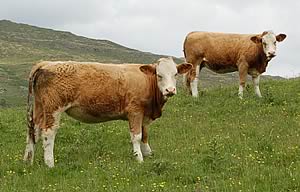 |
|||||||||
|
|||||||||||||||||||
|
|
NFUS Foot and Mouth Disease Update With the crisis affecting Scotland’s livestock sector deepening by the day, NFU Scotland has set out the latest developments as discussions with the Scottish Government and vets continue.
Movement restrictions – NFUS is pressing, as a top priority, for a relaxation to allow movements of animals within a farm for management reasons and between different farms. The latter would allow sheep to be moved to new grazing areas. Emergency measures – Measures to address the financial crisis on farms and the looming welfare disaster were discussed with the Scottish Government at the stakeholder meeting yesterday and will be again today. NFUS has this morning issued a survey of its members to identify the exact requirements of a welfare disposal scheme, as talks continue with Government on the detail. Regionalisation for exports – The Scottish Government, together with other GB administrations and in line with advice from the European Commission, is currently working at classifying GB into different areas of according to disease risk. Until this is done, farming bodies have reiterated their request for abattoirs not to bring English stock into Scotland. Once the classification is complete, it will be clearer how GB could be divided in terms of the future relaxation of export controls and the implications that would have for the movement of live animals and processing of meat across GB. Drivers’ hours – The anger at the UK Government’s dismissive approach to the Scottish haulage problems remains. NFUS continues to appeal for common sense from London. **Biosecurity warning - NFUS is reminding all its members of the critical importance of biosecurity and adhering to all conditions associated with the current movement licences. Any breaches will jeopardise the existing relaxations available and delay the future unwinding of restrictions. NFUS President Jim McLaren said: “The calls we are receiving into our offices around the country are becoming increasingly desperate. We estimate there will be at least a million lambs on the hills that shouldn’t be there. That is generating a huge welfare crisis. Grazing is running out and the prospects of there being enough nutrition available for ewes over the Winter are horrendous. We’re continuing to work on the details of schemes to alleviate the welfare problems and address the cashflow nightmare across the country. “Obviously getting movements going is the best thing that can happen as it would ease the pressure on grazing and could generate cashflow. “The confirmation of the fifth case in Surrey doesn’t change much because the infected farm is in the protection zone. But it is a reminder once again of the need for biosecurity. We are urgently pressing for a relaxation for movements within and between farms as the next top priority. But frankly, government and vets need confidence that farmers are adhering strictly to every licence condition already set out if we are to keep the current relaxations and secure more. I would ask every farmer in the country to keep that in mind.”
|
||||||||||||||||||

|
|
||||||||||||||||||
| home | agri-services | pedigree
pen | news | dairy | beef | machinery property | organisations | site map |
|||||||||||||||||||

